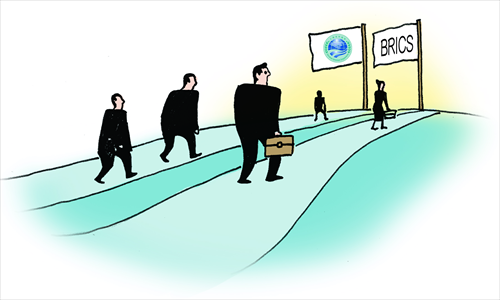Ufa summits sign of shift in Eurasian geopolitics

Illustration: Liu Rui/GT
The summits of the BRICS countries and the Shanghai Cooperation Organisation (SCO) will be held from Wednesday in the Russian city of Ufa. They are the most important meetings of the two regional organizations this year. Leaders of both the BRICS and the SCO will gather to discuss global affairs such as the world economy, regional cooperation, the formulation of security norms and institutional buildup.
It is the first time that the two major events will be held one after the other in the same city. It is both a coincidence and inevitable. The joint convention will not only save costs for venue construction and organization, but also reduce the time costs for state leaders and boost efficiency. Meanwhile, under the current international landscape, the agendas of the two summits have a lot in common. The joint convention will help the countries find more common ground and expand the clout of the two summits.
In addition, both China and Russia are important participants of the two mechanisms. India belongs to the BRICS group, and is actively seeking a membership in the SCO. As the two meetings will be held in Ufa, it reflects a profound change in the Eurasian geopolitical situation.
First of all, changes are taking place in Eurasia's geopolitical architecture which was led by Western powers in the past. Due to the rapid development of emerging economies, international power has been shifting to emerging countries which have an increasing say in rule-making. The topics featured in the two summits will not be limited to regional topics but will extend to global subjects.
Second, given the current state of international relations, emerging countries are more willing than ever to seek common development. The available mechanisms for cooperation are improving and having an impact on the new international structure. Cooperation and joint governance will become the mainstream of major power competitions.
Third, against the background of a global financial crisis that has yet to end and the ongoing European debt crisis, there is a growing need for emerging countries, including Eurasian countries, to deepen cooperation. The Ufa summits will unite the participating countries in political, economic and security areas by covering richer and more pragmatic subjects.
Fourth, as the Ukrainian crisis is far from over and Russia is still being contained by Western countries, the two summits may provide possibilities for solving the crisis and promoting regional peace.
Last but not the least, the China-proposed Silk Road economic belt and Asian Infrastructure Investment Bank will be among the major topics during the two summits. China's support and participation will guarantee the sustainable development of the two mechanisms.
According to Russian media, a "BRICS Economic Partnership Strategy" will likely be passed in the BRICS summit. A BRICS development bank and an emergency reserve fund will possibly see some breakthroughs. This shows that BRICS nations have reached an agreement on the future strategy of this mechanism. The primary conditions for closer economic relations and integration have taken shape.
As for the SCO, it has borne rich fruits after years of development and come to the critical moment for deepening this institution. The Ufa summit is expected to pass a development strategy up to 2025, which will undoubtedly become a milestone in this organization's development. This guiding document will expand the cooperation of member countries in various fields such as security, economy and humanitarian efforts. Cooperation measures in trade, investment, energy and finance will also be announced.
The SCO may also embrace new members. How to ensure transparency and efficiency in the expansion of its membership has always bothered SCO member states. Consensus may be achieved in concrete topics such as how to list India and Pakistan as new members.
It is expected that the Ufa summits will make achievements and represent the concerted efforts of emerging countries to participate in international and regional affairs. The two mechanisms will push pragmatic cooperation and extend their global influence, which bears a landmark significance.
The author is an associate research fellow of the Institute of Russian, Eastern European, Central Asian Studies at the Chinese Academy of Social Sciences. opinion@globaltimes.com.cn